(4) Gender and Inclusive Growth
1. Promotion of Women’s Empowerment and Participation
The social norms and systems in developing countries are generally shaped by men’s perspectives, which renders women to be put in vulnerable positions in many aspects. Compared to the early 2000s, when the MDGs were established, girls’ enrolment rate has improved considerably, women’s political participation has increased, and as a result more women hold senior-level posts. However, there are still many countries where women continue to lack the same opportunities as men to participate in decision-making processes, which is not restricted to the public sphere such as high-level government decision-making, but also includes family and other private decision-making that affect the lives of women.
On the other hand, women are critical actors of development, and their participation will lead not only to the improvement of their own lives but also to more effective development. For example, improving the literacy of women who have had little or no educational opportunities so far, increases their access to correct information on public health and prevention of infectious diseases such as HIV/AIDS. This leads to appropriate family planning and promotes women’s social advancement and economic empowerment. Moreover, it contributes to the inclusive economic growth of developing countries.
In the 2030 Agenda for Sustainable Development (2030 Agenda) adopted at the United Nations Summit in 2015, it is strongly and clearly expressed that “Realizing gender equality and the empowerment of women and girls will make a crucial contribution to progress across all the Goals and targets.” Moreover, Goal 5 of the SDGs seeks to “Achieve gender equality and empower all women and girls.” Gender equality and promoting women’s empowerment are essential for realizing “quality growth.” For this purpose, it is important for men and women to participate equally in all phases of development cooperation and to reap the benefits equally.
●Japan’s Efforts
With a determination that the 21st century should be a world with no human rights violations against women, Japan has been playing a leading role in the international community to promote gender mainstreaming and women’s empowerment in order to build “a society where women shine” both domestically and globally, by setting the following three priority fields: (i) promotion of women and girls’ rights, (ii) improving an enabling environment for women and girls to reach their full potentials, and (iii) advancing women’s leadership in political, economic and other public fields.
Since 2005, women have been a major topic of discussion at the G7 and G20 Summits, and Japan has actively participated in discussions within the international community. For example, Japan strongly supports the Women Entrepreneurs Finance Initiative (We-Fi)*, of which the launch was announced in July 2017 at the G20 Hamburg Summit with a contribution of $50 million. This is an important initiative that aims to help women in developing countries make their own living and promote their active involvement and contribution to society. Moreover, in March 2019, Japan held the 5th World Assembly for Women (WAW!) at the same time as the meeting of Women 20 (W20), a group led by the private sector that makes proposals to the G20 for enhancing the economic activities of women. During the meeting, Prime Minister Abe stated that Japan would provide opportunities for quality education and human resources development to at least four million girls and women in three years until 2020 in order to expand opportunities for education among women in developing countries. Furthermore, at the G20 Osaka Summit held in June 2019, women’s empowerment was picked up as one of the main themes, and there were discussions on three points: (i) women’s labor participation, (ii) support for girls’ and women’s education, and (iii) reflecting the voices of women business leaders including women entrepreneurs. In addition, the Leaders’ Special Event on Women’s Empowerment was held with the participation of the G20 Leaders, and the G20’s commitment to promoting women’s empowerment was reaffirmed.
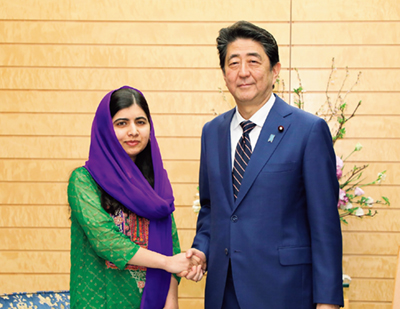
Prime Minister Abe receiving a courtesy call from Ms. Malala Yousafzai, Nobel Peace Prize Laureate, who visited Japan on the occasion of the 5th World Assembly for Women (WAW!) (March 2019) (Photo: Cabinet Public Relations Office of the Government of Japan)
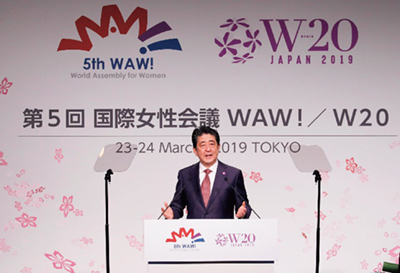
Prime Minister Abe giving the opening speech at the 5th WAW! (Photo: Cabinet Public Relations Office of the Government of Japan)
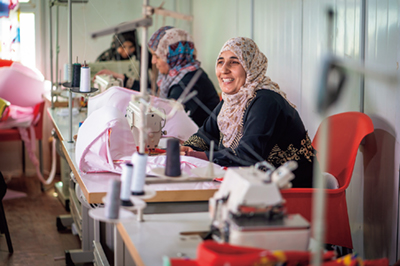
Female Syrian refugees receiving job training on sewing techniques at Oasis (Photo: UN Women)
Japan also provides assistance through UN Women. Japan provided approximately $24 million in 2018 and around $18 million in 2019 to contribute to initiatives for the political participation and economic empowerment of women, the eradication of sexual and gender-based violence against women and girls, a stronger role for women in the peace and security fields, and the strengthening of gender considerations in policies and budgets, etc. For example, in Jordan, 203 Syrian female refugees were given assistance in exchange of their work under the “Cash for Work” Program at the Zaatari refugee camp and the Azraq refugee camp, and 50 female refugees successfully launched a microbusiness(Note31) as entrepreneurs. In addition, through Oasis, a center to support women located in Jordan, Japan provides assistance for job training as well as support in the field of care services. This enabled the provision of counseling and psychological support services to over 700 women in refugee camps, while 99 men and boys acquired correct knowledge on gender-based violence through training on this topic. This support has yielded results, including the fact that 93% of the women who received support in Jordan answered that domestic violence had decreased, and 75% answered that female decision-making in the household had increased.
Japan considers that sexual violence in conflict cannot be tolerated. Therefore, Japan places importance on collaboration with the UN (OSRSG-SVC: The Office of the Special Representative of the Secretary-General on Sexual Violence in Conflict). In 2019, Japan provided over $1.53 million in assistance to the OSRSG-SVC for projects in Iraq, the Democratic Republic of the Congo, and Central Africa, and is contributing to preventing sexual violence and strengthening response capacity through support for improving the judicial system to punish perpetrators.
Furthermore, based on the view that in order to realize a peaceful society more effectively, it is vital to integrate a gender perspective and to secure women’s participation in all stages of conflict prevention, conflict resolution and peace-building, Japan established its National Action Plan for the implementation of United Nations Security Council resolution 1325 on Women, Peace and Security (WPS) and other relevant resolutions in 2015, and has been implementing the Plan. In March 2019, the revised version was formulated. Moreover, under the G7 WPS Partnership Initiative agreed upon at the G7 Foreign Ministers’ Meeting in 2018, Japan chose Sri Lanka as its partner country and from FY2019, Japan, in cooperation with the embassies of each G7 country in Sri Lanka, has been assisting Sri Lanka with the formulation of its WPS Action Plan, and also providing assistance in the field of health centered on reproductive health and for the financial empowerment of Sri Lankan women, including women who became widows due to the internal conflict over the past 26 years.
Japan will continue to cooperate with other countries to address the diversifying development issues through these efforts for achieving the empowerment of all women and girls, gender equality, and building a society and system in which men and women support each other.
Guyana and Commonwealth of Dominica Public nomination
Project for Strengthening Women’s Disaster Management Capacities in Guyana and Dominica (through UNDP)
Grant Aid (Partnership with UNDP) (June 2018 - June 2021)
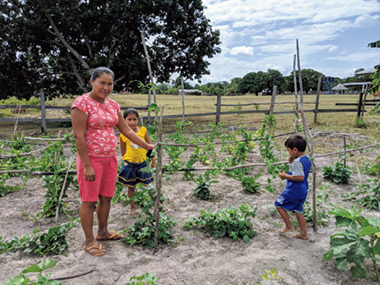
A woman who started a vegetable garden in her home after joining a participatory agrometeorology workshop (Photo: UNDP Guyana)
The Republic of Guyana located on the north coast of the South American continent, and the Commonwealth of Dominica, a small island nation in the Caribbean Sea, are heavily impacted by climate change and have been subjected to many natural disasters. In fact, Dominica was seriously damaged by Hurricane Maria in 2017. Moreover, although approximately 90% of the populations of Guyana and Dominica live in coastal areas, they are facing the difficulties of coastal erosion and flooding caused by the rise of sea levels due to global warming. Climate change has become a major challenge that threatens the people and territory of the two countries.
In 2018, Japan began to provide assistance in partnership with UNDP to stabilize livelihoods and strengthen disaster response capabilities, mainly for women who are particularly vulnerable in times of disaster in remote and coastal areas of disaster-prone Guyana and Dominica. Through this cooperation, disaster risk reduction capacity in a total of 1,400 communities (around 20,000 households) is being strengthened through the development of an early warning system for natural disasters. Moreover, the stabilization of livelihoods through enhancing opportunities for micro-grant mechanisms and establishing information sharing and collaboration systems between communities through participation in workshops are being promoted.
For example, a participatory agrometeorology workshop was held to teach how to choose means of livelihood, including selecting appropriate agricultural crops and livestock based on weather information (past data and future forecast) according to each region. Such efforts have strengthened the capacity of both representatives of women who live in inland and coastal rural areas of Guyana that are vulnerable to flooding and drought, as well as leaders of the Ministry of Agriculture. Based on the experience they gained from the workshop, some women started planting vegetables in their home gardens. There were about 450 participants of the workshop in the first year of the project, and the number of participants has continued to increase steadily thereafter.
- *Women Entrepreneurs Finance Initiative (We-Fi)
- An initiative launched by the World Bank with 14 participating countries, aiming to support the economic independence of women in developing countries and to promote their social and economic participation, by implementing support to overcome the challenges which women entrepreneurs and women-led SMEs in such countries face including access to finance, legal systems, and others. The types of assistance We-Fi provides include financial access assistance for women entrepreneurs, advisory service to facilitate greater business with women entrepreneurs and technical assistance to improve the legal and regulatory systems of developing countries. The initiative is aiming to make more than $1 billion funds available, with approximately $350 million from donor countries and additional resources from the private-sector and international financial institutions.
2. Reducing Disparities (Assistance for People who Tend to be in Vulnerable Situations)
Ongoing efforts are being made to implement initiatives towards the achievement of the SDGs. Meanwhile, a number of issues such as the difficulty in identifying where problems lie and addressing them properly from the broader national level are gradually being brought to light. Even when responding to the “increase of disparities,” similar problems exist. Moreover, challenges such as poverty, conflicts, infectious diseases, terrorism, and natural disasters have varying impact depending on the situations that individuals are in, including their country and region, or whether they are women and/or children. In order to deal with this situation, it is effective to adopt an approach that takes the standpoint of individual people, which is indispensable for the realization of a society that fulfills the SDGs principle of “no one will be left behind.”
●Japan’s Efforts
Assistance for Persons with Disabilities
It is important that capacity building and community development are promoted to ensure the social participation and inclusion of people in vulnerable situations in society, especially persons with disabilities. It is Japan’s policy to pay due attention to the socially vulnerable, including persons with disabilities, when planning and implementing ODA policies for development cooperation. Policies for persons with disabilities cover a number of different fields, including welfare, health and medical care, education, and employment. Japan has applied the techniques and experiences it has accumulated in these fields for measures and policies for persons with disabilities in developing countries through ODA and NGO activities.
For example, Japan carefully tailors its assistance to suit various local needs, such as incorporating barrier-free design in the planning of railroad and airport construction, developing vocational training centers and rehabilitation facilities for persons with disabilities, and providing minibuses for their transportation. Additionally, through JICA, Japan provides a wide range of technical cooperation to enhance the capacity of organizations and personnel offering assistance to persons with disabilities in developing countries. These efforts include the acceptance of trainees in Japan from developing countries and the dispatch of JOCVs and experts in relevant sectors, including physical and occupational therapists and social workers.
The Convention on the Rights of Persons with Disabilities ratified by Japan in 2014 established independent clauses setting out that state parties would undertake measures for international cooperation and its promotion (Article 32), and Japan continues to contribute to improving the rights of persons with disabilities in developing countries through ODA and other means.
Tajikistan
(1) Promotion of Inclusive Education for Children with Disabilities in Dushanbe
(2) Promotion of Inclusive Education (IE) for Children with Disabilities in Hissar
Grant Assistance for Japanese NGO Projects ((1) January 2014 - February 2017, (2) June 2017 - (ongoing))
In Tajikistan, many children with disabilities are unable to attend school or receive education that is considerate of their disabilities due to traditional thinking about children with disabilities and inadequate school admissions systems. In order to deal with this situation, the Association for Aid and Relief, Japan (AAR Japan), as the only Japanese NGO operating in Tajikistan, has been implementing projects from 2014 with the aim of promoting “inclusive education” that enables all children, regardless of whether or not they have disabilities, to study at mainstream schools in their communities while receiving consideration for the characteristics and/or disabilities of each child.
Initially there were some people opposed to admitting children with disabilities to schools. However, understanding towards inclusive education gradually spread by promoting various initiatives, such as development of barrier-free renovations of schools, establishment of resource classes for children with disabilities where they can receive appropriate learning support and occupational therapy, training for teachers, and awareness-raising activities for parents and community residents. Today, many children with disabilities are enrolled in schools, and even parents of children without disabilities are saying that it is a good thing that children with disabilities are now able to attend schools with their children and that their children have become more kind and considerate of others.
In the capital city of Dushanbe, a total of 230 children with disabilities have been able to attend schools through a three-year project. Even after the completion of the project, a group of local people there opened the country’s first cafe where children with disabilities are able to work. In this way, these initiatives and support for children with disabilities have been steadily taken up by the local people and are expanding.
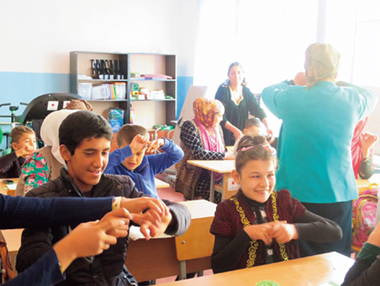
Learning sign language in an equipped resource class for children with disabilities (Photo: AAR Japan)
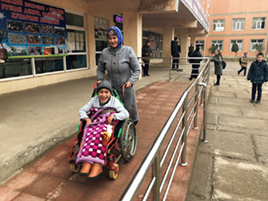
A student with disabilities and her mother using the renovated entrance ramp with a donated wheelchair (Photo: AAR Japan)
Assistance for Children
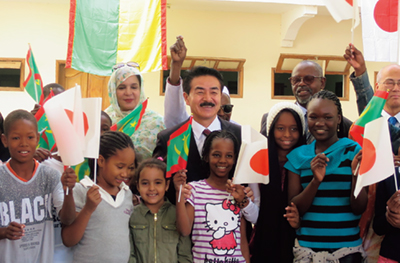
Former State Minister for Foreign Affairs SATO Masahisa surrounded by children at an elementary school in Mauritania, constructed with support from Japan (February 2019)

A dance performance by children on the school grounds of Fidel Castro Ruz Primary School in Namibia, where Japan supported the construction of classrooms
Generally, children tend to be in vulnerable situations, and today, there are many children in regions around the world that have been placed in harsh environments due to conflicts, natural disasters, etc. Also, the number of refugees and internally-displaced children is rapidly increasing. Japan is providing a variety of humanitarian and development assistance to improve the situation of children in developing countries.
For example, through the Grant Assistance for Grass-Roots Human Security Projects, Japan provides cooperation that directly benefit residents at the grass-roots level. Under this scheme, Japan is implementing projects, which contribute to improving the living conditions of children such as the construction and refurbishment of elementary and junior high schools, provision of medical equipment to hospitals, and development of wells and water supply facilities.
Specifically, in Myanmar, Japan is cooperating in the construction of a new school building at Lay Yin Kwin Ward Basic Education High School in Puta-O Township, Kachin State, where many minority children and students go to school. It is expected that this assistance will contribute to improving the learning environment for the 968 children and students who took classes at the severely aged school building. In addition, in 2019 in Nepal, Japan provided assistance through the Grant Assistance for Grass-Roots Human Security Projects for the construction of a School Lunch Preparation Center for public schools in Budhanilkantha Municipality in Kathmandu District, where many children from economically poor households are enrolled. This cooperation provides school lunches to about 5,000 public school students in the city, and is expected to improve the students’ nutrition and learning environment. Moreover, through the Project for Construction of School Classrooms in Fidel Castro Ruz Primary School in Tobias Hainyeko Constituency, Khomas Region, Namibia, five new classrooms were constructed at the school, enabling over 630 children to learn effectively by reducing the number of children per class.
Japan also provides assistance in cooperation with international organizations. With regard to Cambodia, Japan signed an Exchange of Notes concerning the grant aid “Project for the Prevention of and Response to Violence against Children in Cambodia (through UNICEF)” in January 2019. Under this project, Japan will conduct training that is recognized worldwide for the eradication of violence for the government officials of Cambodia, in order to further expand the implementation scale of the main initiatives to prevent and respond to violence against children. In addition, Japan will strengthen the communication skills of social workers and medical professionals, who actually come face-to-face with the children. This is expected to lead to a reduction in physical violence in educational settings, etc. and to the creation of an environment in which children who have suffered physical violence can easily consult with counselors.
In addition, Japan, in cooperation with WFP, provided assistance to Pakistan regarding the distribution of nutrition supplement foods and nutrition and health training to infants, pregnant women and lactating women among Afghan refugees, internally displaced persons, and the host community in Khyber Pakhtunkhwa Province in 2019. This cooperation is expected to improve the nutrition of infants and pregnant and lactating women, through the enhanced nutritional intake of approximately 30,000 infants and around 28,000 pregnant and lactating women who are diagnosed with malnutrition, and mentor training for over 200 female healthcare workers in the target area of the Province.
Furthermore, in Afghanistan, Japan signed an Exchange of Notes regarding the grant aid “Project for Infectious Diseases Prevention for Children (through UNICEF)” in December 2019. This cooperation enables vaccinations for approximately 1.31 million babies under the age of one and 2.92 million women in the reproductive age group, through support for the provision of vaccines necessary for routine immunizations. This support will also enable the polio vaccination of a total of 11 million children under the age of five. Furthermore, it is also expected that the steady implementation of campaigns for routine immunizations and the polio vaccine will contribute to preventing and eliminating infectious diseases among children, such as polio, throughout the country (see “Polio” for details on support for polio prevention and eradication).
- Note 31: A microbusiness is a small-scale business started by an individual or small group of people with minimal funding.
